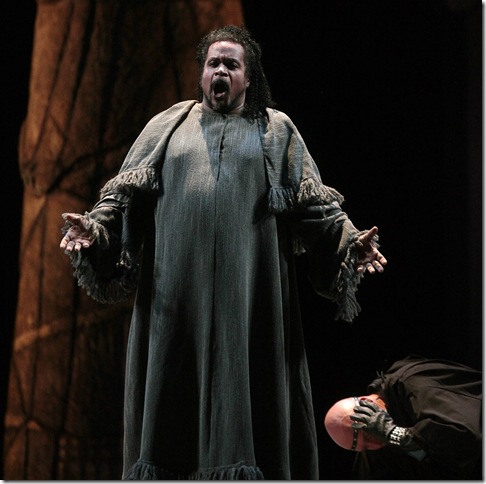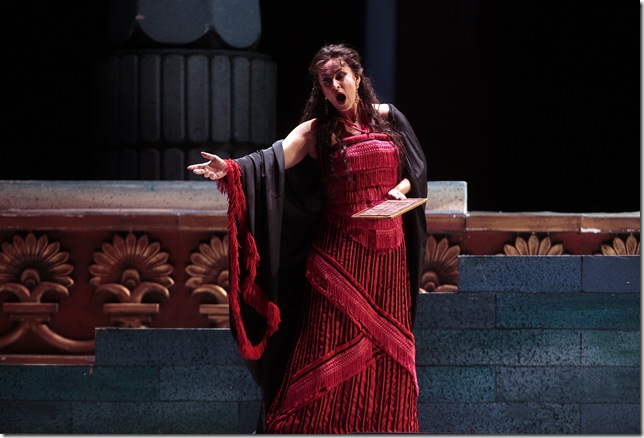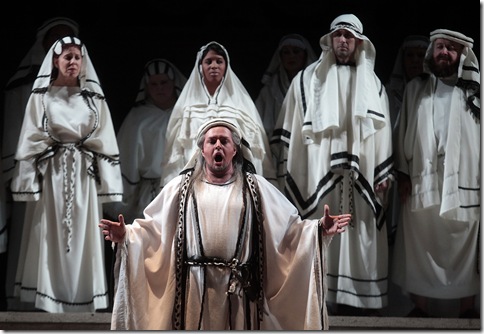It takes a lot of big singing to fill up all the space in the static tableaux of Verdi’s Nabucco.
And on Friday night at the Palm Beach Opera, most of that sonic filling was provided by two singers other than the principals: a sonorous bass as Zaccaria and a thrilling tenor as Ismaele.
For its first production in 25 years of Verdi’s breakthrough 1842 Biblical drama, Palm Beach Opera has called on two veteran singers, baritone Mark Rucker as Nabucco and soprano Paoletta Marrocu as Abigaille. Both vocalists have sung these roles many times, and that was evident in their acting; it can safely be said both musicians made the very most of the stage parts of their roles.
But in the case of Marrocu, her singing was distinctly variable, sometimes large and commanding, and at other times overblown, ragged, or under pitch. At its best in Friday night’s performance at the Kravis Center (the Act III duet with Nabucco, Oh di qual onta aggravasi), it’s a voice with power and attractive colors, especially in the lowest register.
Still, Marrocu was not in great voice overall Friday night, skipping the famous interpolated high C in the Salgo gìa cabaletta that ends the first scene of Act II, and while she had a strong stage presence, it’s the singing that needs to fill the room, and she was only able to do that occasionally.
Rucker’s voice was much more consistent. It’s a very pleasant baritone instrument, nicely focused if not especially large, and it’s well-rounded across its range. Despite some stiffness in his stage movements, he sang and acted with real subtlety in a part that doesn’t have a lot of it, trying his best to add emotional confusion to his moments of kingly madness.
His singing got noticeably warmer and more engaging in Acts III and IV, and his Dio de Giuda at the end was heartfelt and effective. He was a persuasive if not dominating Nabucco, one whose work in this role might be better appreciated in a concert setting.
The most exciting singing of this opening night of the company’s 49th season came from Dmitry Belosselskiy as Zaccaria, the high priest of the Jews, and Adam Diegel as Ismaele, lover of Fenena.
Belosselskiy, a Ukrainian-born musician, has one of those big, beautiful bass voices that infuses everything he sings with authority. He was particularly good in the lovely Tu sul labbro, the Act II prayer with its radiant six-cello accompaniment, but everything he did was worth listening to, and one welcomed his return to the stage each time he appeared.
It’s not for nothing that when Montserrat Caballé wanted to introduce a new tenor named José Carreras, she had him first appear as Ismaele, because while it’s a small role, it’s aggressive and passionate, and a perfect spotlight for a fresh new voice. Diegel, who was an excellent Don José for Florida Grand Opera’s Carmen last season, was a terrific Ismaele, with a vivid spinto that ideally embodied the character of the young lover who would sacrifice his life for his captive people.
Almost as good was mezzo Laura Vlasak Nolen as Fenena, whose voice was weighty and strong in the Io t’amava trio of Act I, and sweetly pure in her O di schiuso è il firmamento aria in Act IV, where the richness of her singing across a wide range could clearly be heard.
Harold Wilson as the high priest of Baal was decently effective, but Evanivaldo Correa’s Abdallo was underpowered. And while no one knew who Alison Bates was when she took her curtain call as Anna, her large, powerful soprano commanded instant attention as it soared above the rest of the chorus in the massed numbers of the final act. One looks forward to her future appearances as a member of the company’s Young Artists troupe.
The chorus had the first curtain call along with chorus master Greg Ritchey, as was only fitting for such a chorus-heavy opera, and in truth they sang well most of the evening, especially in the most celebrated moment, the Va, pensiero of Act III, and in the closing Immenso Jeovha of the last act, which was suitably forceful. The men, though, ran into some real trouble in Act II’s Il maledetto non ha fratelli, which apparently was much too fast for them to be able to keep up and maintain their diction.
Conductor Bruno Aprea, who led a very vigorous Norma two seasons ago, brought the same kind of relentless drive to early Verdi as he did to Bellini, and one gets the sense that he likes to champion early 19th-century Italian opera above all. And he made a good case for it: This was a swiftly led, highly colored Nabucco, and its pace and fire, which tells us a lot about the innovations Verdi brought to this art form, would have been easier to appreciate had the show opened on time, and had the intermission before Act II not been somewhat too lengthy.
The orchestra he had on hand, filled with some of the best musicians in the area, was very good, from the exposed brass soli in the overture to the solo flute work at the end, with the cello sextet playing in Tu sul labbro especially fine.
The sets from the Opera de Montreal were very spare and centered on focalpoints such as a huge head of Baal, while the costumes (also from the Canadian company) were overwhelmingly modest and straight out of a Sunday school textbook, shunning big headdresses for Zaccaria and Nabucco, which was debatably acceptable, and any sense of sexuality for Abigaille and Fenena, which was not. Nabucco is also a love story, and clothing Fenena in a shapeless semi-burqa makes no sense if you want to bring out that element of the opera, her subject status notwithstanding.
Guy Montavon’s staging was clean but too rigid, which gave the whole production an offputting sense of awkwardness and unreality. The chorus moved in big, orderly blocks on and off rather than like crowds, and there was too little interaction among the characters in general, so that it was hard to figure out how everyone related to each other and to follow the story.
It would have helped, too, to have an actual sound to go along with the lightning bolt that hits Nabucco in Act II, and the wisps of smoke rising from the temple at the end of Act I looked like a toaster accident rather than an act of war.
Nabucco continues tonight at the Kravis Center with Sebastian Catana as Nabucco and Csilla Boross as Abigaille. Rucker and Marrocu return on Sunday afternoon, Catana and Boross on Monday afternoon. Tonight’s performance begins at 7:30 p.m., and Sunday and Monday’s shows are set for 2 p.m. Tickets are $23-$175, and can be had by calling the Kravis box office at 832-7469 or visting www.kravis.org, or by calling the opera at 833-7888 or visiting www.pbopera.org.


